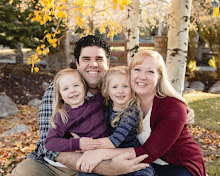My mom asked me once what I felt I had learned since my dad's diagnosis. Or maybe she asked how I felt like I had changed. Either way, I don't remember what I said to her, only what I wanted to say: I've learned how to be afraid.
What will my dad miss - birthdays, babies, weddings, graduations? What will we miss because he's not here? How can we do anything without him? What won't ever be the same? How could anything be? And sooner than that, what will my dad have to endure? Will he suffer? Will we? Will I?
I don't know what it's like to be told that you have cancer, but I know what cancer means. It means fear and uncertainty and all your plans fracturing. It means hospitals and doctors, unending treatments and surgery. It means bad news and facing the worst while hoping for the best. It means lots of prayers. It means dying. Just the word "cancer" makes you want to hold on tighter to everything you have, but what becomes very clear very quickly is that you no longer have any control. Things are going to happen whether you want them to or not, and you have to search for the choices you can still make.
I'm no longer angry that my dad has cancer; I've made my peace with what seemed to me for a long time to be a lack of miracles. Well, mostly. It's not fair; it never was and it never will be. But I've found a few things I can control and I cling to those. For most of the past five years since my dad was diagnosed, I thought that cancer meant grieving. Not just grief, but active, ongoing grieving, and I couldn't handle that. I chose to put it away and never look at it for too long or too hard. I thought I had come to terms with it, but really I had just found a balance between denial and acceptance - one foot in each camp.
What I understand now is that cancer is a process. The process of coming to terms, of learning to cope, of overcoming anger and fear, of loving more deeply, of finding support, of growing closer to God. For most cancer patients, it's the process of dying, but I've come to believe it's also the process of living and of making life meaningful.
"Love is stronger than cancer." That's what our shirts said. We made them and wore them proudly, but I wrestled with that phrase because no matter how much I love my dad, cancer will eventually take him away from me. I understand now that cancer can't ever take away how much I love him or how much he loves me. That doesn't change. Love, family strength, memories - cancer can't touch those. In fact, during the first few months after the diagnosis, I remember feeling like our little family was closer and stronger than ever.
Cancer is hard. The realities of cancer have always been hard. There is faith and hope and love and life, but there is also disappointment and pain and fear and death. Mostly, there is just hard. It's the kind of hard that hammers at you, especially when you least expect it to. It weighs you down with wondering; it wears on you; it wearies you. Truthfully, it is awful every single day.
In the meantime, there is life that has to be lived and choices still to be made. Finding strength to make those choices - deliberately, consciously - can be the hardest part of all, but it's also what can save us. We can choose to spend our time meaningfully, to cherish the people we have, to love unreservedly. We can choose to make room for pain and disappointment instead of trying to shut it out, and we can choose faith in spite of our fears. We can choose not to dwell on the end or let the cancer take control. These are choices that have to be made and re-made every day; sometimes circumstances force you back to square one with all the grief and pain of a new diagnosis, but the choices are still ours to make. If my mom asked me that same question today, what have you learned?, I would still say that I've learned how to be afraid, but I've also learned how to choose faith and love over fear and death.
That is what cancer means.

No comments:
Post a Comment